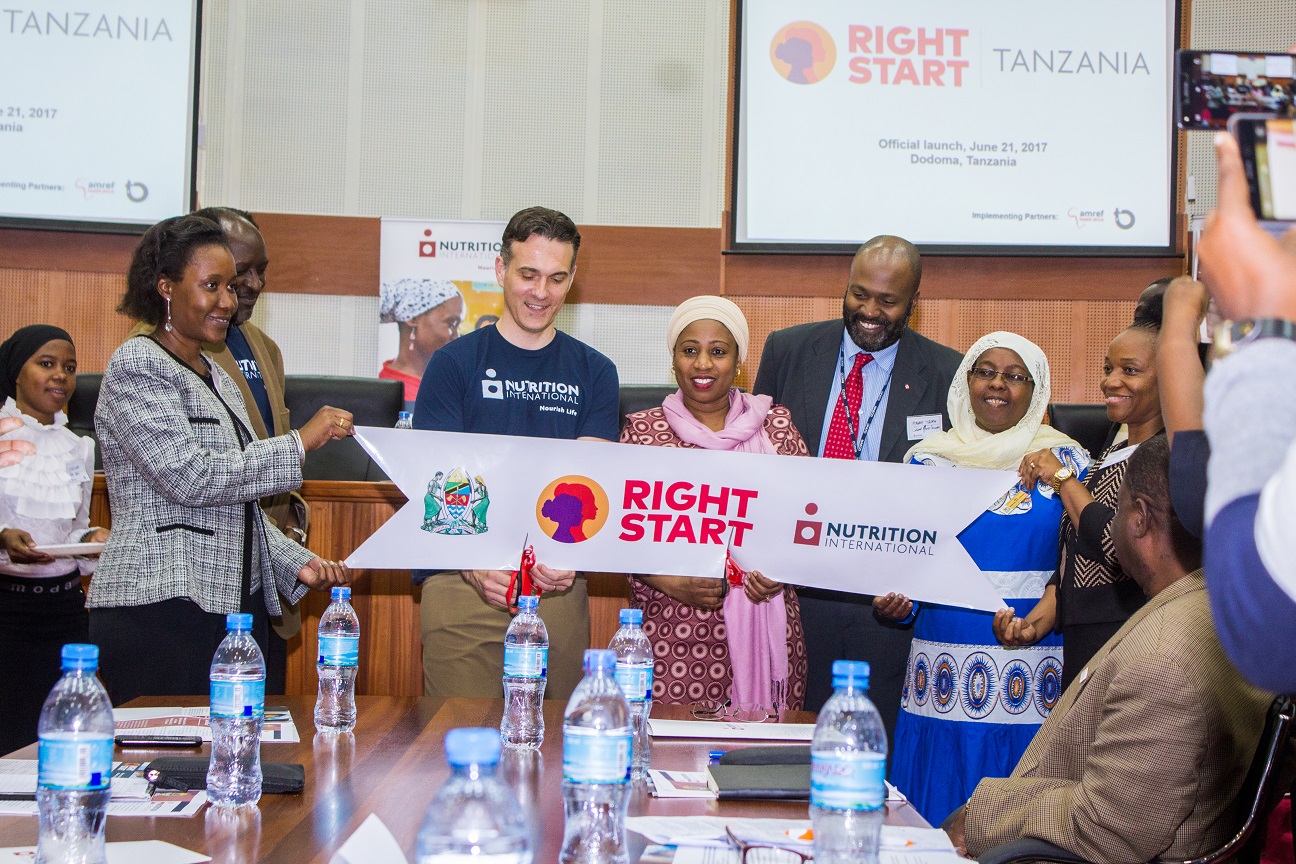All News
World Vision-led REACTS-IN receives $44 million to transform nutrition, empower women and promote gender equality
May 26, 2023
Nutrition International launches ‘Right Start’ to provide better nutrition for women, adolescent girls and children in Tanzania
Nutrition International launched the ‘Right Start Initiative’ in Tanzania to improve the nutrition and health of women, adolescent girls, newborns and young children in the country through a $CAN 2.8M (4.7B TZS) investment over five years to 2020.
Posted on June 21, 2017


Dodoma, TANZANIA ̶ Nutrition International launched the ‘Right Start Initiative’ in Tanzania to improve the nutrition and health of women, adolescent girls, newborns and young children in the country through a $CAN 2.8M (4.7B TZS) investment over five years to 2020.
Supported by the Government of Canada, the program aims to reduce anaemia, neonatal mortality, as well as the number of low birth weight newborns. It also seeks to reduce stunting in children under five years old.
The five-year project will target the Mwanza and Simiyu regions and reach over 130,000 pregnant women with WHO-recommended iron and folic acid supplementation, more than 90,000 newborns with a package of interventions at birth, 94,000 adolescent girls with weekly iron and folic supplementation and nutrition education, and up to 366,000 children under two years old with nutrition services.
This will be the largest program to be implemented by Nutrition International in Tanzania since the organization opened its country office in Dar es Salaam in September 2016.
“We look forward to working with governments and partners to support Tanzania in its efforts to improve nutrition, especially for women and girls,” said Joel Spicer, President and CEO of Nutrition International. “We believe investing in nutrition is investing in the future. Well-nourished adolescent girls are better able to get an education. Well-nourished women have safer pregnancies, healthier children and are more productive members of the workforce. Well-nourished infants and young children are better able to fight illness, and have a better chance of becoming contributing members of society.”
“This initiative is very relevant in contributing to our current national development agenda. I would therefore like to express my support and thanks to Nutrition International and the Government of Canada for bringing the Right Start Initiative in Tanzania, being among the few countries chosen in Africa,” said the Honourable Ummy Mwalimu, Tanzanian Minister of Health, Community Development, Gender, Elderly and Children. “This will inevitably make a significant contribution to our country’s efforts in fighting malnutrition, but also building a strong workforce to support our national industrialization agenda.”
Tanzania is making some progress towards reaching the World Health Assembly targets for stunting and wasting. However, it is off course to reach the anaemia targets, with 45 percent of women of reproductive age suffering from it and 57 percent of pregnant women. Maternal and infant and young children nutrition indicators also need to be improved: only 59 percent of children below six months of age are exclusively breastfed and 34 percent of children under five are stunted. This can have long-term impacts on their physical well-being, their cognitive development and performance at work or school, and economic productivity in adulthood.
The main interventions of the Right Start Program in Tanzania include:
“While Tanzania is making progress towards ending malnutrition, there still is a lot of work to be done, especially for women and adolescent girls, and we are proud to contribute to these efforts through our support to Nutrition International’s Right Start Initiative,” said His Excellency Mr. Ian Myles, High Commissioner for Canada in Tanzania. “This initiative fits squarely with Canada’s newly launched Feminist International Assistance Policy which recognizes that empowering women and girls is key to achieving the Sustainable Development Goals and providing them and their children with better nutrition so they can learn, earn and reach their full potential is crucial.”
“I am particularly proud of our work to improve the nutrition of adolescent girls, as I believe adolescence is a critical window of opportunity for health and nutrition interventions,” said Dr Daniel R. Nyagawa, Country Director, Nutrition International Tanzania. “Improving the nutritional status of adolescent girls will ensure that they can realize their full potential and, if they become mothers in the future, their health and the health of their babies will not be compromised.”
The launch was attended by representatives of senior government officials at national and regional levels, development partners, UN Agencies, academia and research institutions.
Right Start’s main implementing partner in Tanzania are AMREF and the Tanzania Food and Nutrition Centre.
The Right Start Initiative is a multi-faceted initiative aiming to reach over 100 million women and girls with improved nutrition in nine countries across Africa and Asia.
For more information, download the Right Start Tanzania fact sheet (PDF) or infographic (PDF) or read Nutrition International’s President and CEO Joel Spicer’s address.